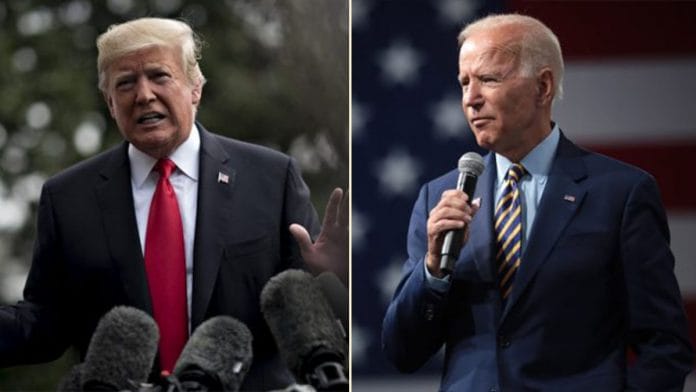New Delhi: US Secretary of State Mike Pompeo and Defence Secretary Mark Esper’s visit to Delhi for the 2+2 ministerial dialogue Tuesday came just days ahead of the US election on 3 November — with some referring to it as a ‘campaign stop’, in a possible attempt to persuade Indian-American voters.
Indian-Americans, the second-largest immigrant group in the US, have become increasingly significant in these presidential elections.
From Trump leveraging his bonhomie with Prime Minister Narendra Modi to Democratic vice-presidential nominee Kamala Harris mentioning her “chittis (aunts)” in her acceptance speech, both the Republicans and the Democrats are vying for their votes.
India was also featured rather prominently in the recently concluded presidential debates. In the final debate on 23 October, President Donald Trump called India’s air “filthy”. Soon after, Democrat presidential nominee Joe Biden criticised Trump for his comment.
Biden also penned an op-ed in India West, an Indian media outlet in the US, on 22 October, claiming that he “always felt deeply connected” to the Indian-American community and recalled hosting a Diwali reception.
The Trump campaign, in turn, launched an initiative called ‘Indian Voices for Trump’ — a coalition of Indian-Americans in the government and private sector — aimed at persuading the community to vote Republican.
Also read: Trump vs Biden? 5 key issues on which Americans will vote for next President
Why Indian-Americans are crucial to 2020 US elections
While Indian-Americans account for only 1 per cent of the total US population and make up 0.82 per cent of all eligible voters in the country, they can make a significant difference in the upcoming election.
This is because they are present in key swing states that are critical to a presidential election. For example, there are approximately 1,25,000 Indian-American voters in Michigan, 1,56,000 in Pennsylvania and 37,000 in Wisconsin. In the 2016 election, Trump won all these states by narrow margins of 0.2, 0.7 and 0.8 percentage points, respectively.
Furthermore, Indian-Americans are the highest-earning ethnic group in the country, making them very influential. According to a fund-raising analysis by the Los Angeles Times, they have donated $5.4 million to Biden and his allies and $3 million to Trump and his backers.
In 2008 and 2012, the Indian-American community voted overwhelmingly for the Democratic Party and for then president Barack Obama.
According to a report by US think tank Atlantic Council, a sizable portion of them started drifting to the Republican party later.
However, recent data from the Carnegie Endowment for International Peace, a foreign policy think tank based in the US, revealed that they haven’t abandoned the Democratic party just yet, with 72 per cent inclined to vote for Biden and 22 per cent for Trump.
Also read: US election night’s most-crucial number is votes yet to be counted
Trump-Modi dynamics aren’t the only deciding factor
The data from the Carnegie Endowment for International Peace also found that “kitchen table” issues like healthcare and the economy are driving the Indian-American community’s vote this year.
Also, some who voted for Trump in 2016 were attracted to his tax policies.
This is contrary to popular belief that most immigrant votes are based on how a candidate relates to their place of origin which in this case refers to India-US relations.
In fact, the nearly 50,000 Indian-Americans, who attended the “Howdy, Modi!” rally in Texas last year where Modi remarked “Ab ki baar, Trump sarkar (This time, Trump government)”, were viewed as a strong voting bloc for the incumbent president. However, data indicates that despite the massive event, a large part of the community may vote for Democrats this year.
At a fund-raising event in September, the Biden campaign reportedly raised a record $3.3 million from the Indian-American community.
Democrat vice presidential nominee Kamala Harris, an American of Indian origin, has also constantly reinforced her Indian roots.
Her nomination in August was seen as a proud moment for Indians, not only in the US but across the world. However, there have also been concerns about the fact that she identifies more as Black than Indian. Harris’ father is from Jamaica while her mother was Indian.
And yet, she continues to be a key factor among the Indian-American community.
The LA Times data revealed that in the 20 days after Biden selected Harris as his running mate, Indian-Americans donated more than $1.2 million to his campaign.
Furthermore, an advocacy group in the US, the Indian American Muslim Council recently also launched an email campaign urging Harris to condemn ‘Brahmanical supremacy’ in the alleged Hathras gangrape-murder case.
Also read: Trump mocks Harris’s laughter, calls Pelosi crazy but says women support him






